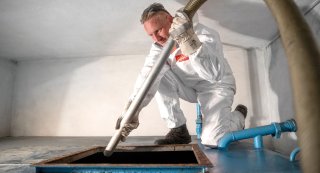Tank cleaning

Our services
- Internal and external cleaning of storage containers, tanks and mineral storage containers
- Degreasing and gas-freeing
- Wall thickness measurement
- Leak testing, stability testing and pressure testing
- Temporary oil storage to ensure even full tanks can be cleaned
- Cleaning of pipes
- Regular inspections of the tank system in compliance with the Water Rights Act
- Completion of maintenance logs
- Disassembly of tank and heating systems
Your benefits
- Lower costs from lower consumption of heating oil
- Trouble-free heating, e.g. no burner malfunctions
- Continuity of operation: Temporary storage of tank contents
- Prevention of corrosion damage
- Prevention of environmental hazards arising from tank damage
- Minimisation of costs thanks to regular maintenance, expert advice and extensive specialist knowledge
- We are SCC** and ISO 45001 certified
Tip
Want to switch your heating from oil to a non-fossil fuel alternative? Now is the perfect time, because subsidies of up to € 10,000 are available.
You want to use our service?
We are looking forward to your enquiry!
Frequently asked questions
- First, a Saubermacher team brings a suction tank vehicle and views the tank room.
- Guards are fitted to prevent contamination or damage.
- Next the tank is opened and the contents are suctioned out. Up to 6,000 litres of heating oil can be temporarily stored in our truck.
- The tank connection and burner line are then dismantled. For steel tanks, an employee climbs into the tank, sucks off the oil sludge from the inner wall of the tank and flushes out the tank with water and a cleaning agent. Plastic tanks (in used since the mid-1980s) are flushed and pressure-cleaned.
- The next step is to reconnect everything. We also change the filter at the customer’s request.
- Before the oil is pumped back into the tank, it is filtered in the suction tank vehicle. This free of charge additional service is only offered by Saubermacher.
- Finally, the heating system is put back into operation and all documents are issued: Confirmation in the maintenance book for tank systems, proof of disposal for residual stock, etc.
Ideally oil levels and operability should be checked once a month in-house. Metal tanks and underground tanks must be subjected to expert inspection every 5 years. Plastic tanks only require such inspection after 18 years, then every 5 years thereafter.
The costs of tank cleaning depend on the size and design of the tank. Small battery tanks are usually cheaper to clean than larger metal tanks. In principle, the costs for tank cleaning range between 700 and 2,400 Euros. Our customer service team will be happy to provide you with an individualised quote.
- We have more than 40 years of experience with disassembly of oil heating systems
- We dispose of old oil tanks in a proper and environmentally friendly manner
- We are happy to purchase any residual oil in the tank
- We have international certifications (safety, health, environment)
- We can help with funding applications
- We provide certificates of disposal for funding purposes
- Decreased oil consumption, leading to lower heating and electricity costs
- Insurance cover (oil tank must be inspected every 5 years)
- Reliable and error-free operation
- Protects the climate and the environment
That depends on the type, size and condition of the tank. For a standard domestic tank, cleaning takes about 2 to 3 hours.
No, we can also clean a tank that still has oil in it. We simply store the oil temporarily in a tank truck, then filter it and pump it back into the tank.
If your heating system is a little older, it may be worth your while to switch to a new system. Especially now: high subsidies are currently available to assist with purchase of new and environmentally friendly heating alternatives.
As things stand, conventional oil heating systems may only be used until 2035. Regular cleaning can extend the life of your system, enabling you to continue to use it until you switch to another type of heating. Ensuring your system is well-maintained reduces your oil and electricity consumption and also protects the climate.
Oil heating systems often malfunction after the summer due to silted lines, dirty oil filters or sediment residues in the tank. Before you restart your heating system, we recommend you to have it checked and cleaned. This will ensure you have reliable heating throughout the winter months.